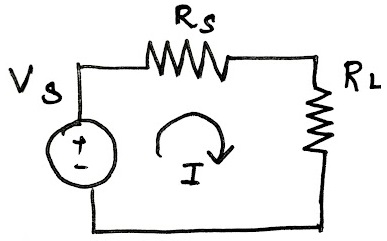4. Given a series circuit with a source (V), source resistance (R.), and load resistance (R₁), show that maximum power transfer occurs when R. = R₁ . Start with the expression for current in the circuit, then with the expression for power dissipated in the load. (Hint: You will need to use calculus to solve).
4. Given a series circuit with a source (V), source resistance (R.), and load resistance (R₁), show that maximum power transfer occurs when R. = R₁ . Start with the expression for current in the circuit, then with the expression for power dissipated in the load. (Hint: You will need to use calculus to solve).
Introductory Circuit Analysis (13th Edition)
13th Edition
ISBN:9780133923605
Author:Robert L. Boylestad
Publisher:Robert L. Boylestad
Chapter1: Introduction
Section: Chapter Questions
Problem 1P: Visit your local library (at school or home) and describe the extent to which it provides literature...
Related questions
Question
answer #4

Transcribed Image Text:3. An antenna has a capacitive reactance of 20 and an inductive reactance of 20 at its
resonant frequency. If the frequency is doubled, what are the new values for X and X₁ ?
4. Given a series circuit with a source (Vš), source resistance (R), and load resistance (R₁), show
that maximum power transfer occurs when R. = R₁. Start with the expression for current in the
circuit, then with the expression for power dissipated in the load. (Hint: You will need to use
calculus to solve).
5. What it is the approximate length of a dipole antenna that is resonant at 150 MHz?
Expert Solution
Step 1: Summarize the details given:
4. Given Data:
Consider the circuit for the given description is,

To Find:
Proof of for the maximum power transfer to the load.
Step by step
Solved in 3 steps with 5 images

Knowledge Booster
Learn more about
Need a deep-dive on the concept behind this application? Look no further. Learn more about this topic, electrical-engineering and related others by exploring similar questions and additional content below.Recommended textbooks for you

Introductory Circuit Analysis (13th Edition)
Electrical Engineering
ISBN:
9780133923605
Author:
Robert L. Boylestad
Publisher:
PEARSON

Delmar's Standard Textbook Of Electricity
Electrical Engineering
ISBN:
9781337900348
Author:
Stephen L. Herman
Publisher:
Cengage Learning

Programmable Logic Controllers
Electrical Engineering
ISBN:
9780073373843
Author:
Frank D. Petruzella
Publisher:
McGraw-Hill Education

Introductory Circuit Analysis (13th Edition)
Electrical Engineering
ISBN:
9780133923605
Author:
Robert L. Boylestad
Publisher:
PEARSON

Delmar's Standard Textbook Of Electricity
Electrical Engineering
ISBN:
9781337900348
Author:
Stephen L. Herman
Publisher:
Cengage Learning

Programmable Logic Controllers
Electrical Engineering
ISBN:
9780073373843
Author:
Frank D. Petruzella
Publisher:
McGraw-Hill Education

Fundamentals of Electric Circuits
Electrical Engineering
ISBN:
9780078028229
Author:
Charles K Alexander, Matthew Sadiku
Publisher:
McGraw-Hill Education

Electric Circuits. (11th Edition)
Electrical Engineering
ISBN:
9780134746968
Author:
James W. Nilsson, Susan Riedel
Publisher:
PEARSON

Engineering Electromagnetics
Electrical Engineering
ISBN:
9780078028151
Author:
Hayt, William H. (william Hart), Jr, BUCK, John A.
Publisher:
Mcgraw-hill Education,